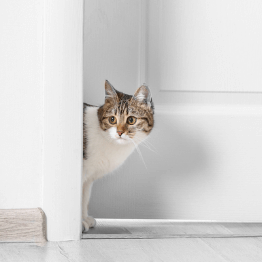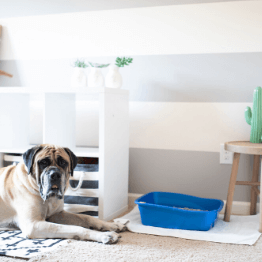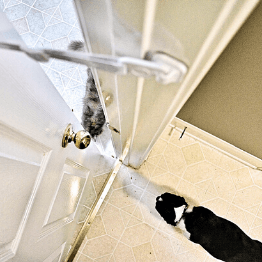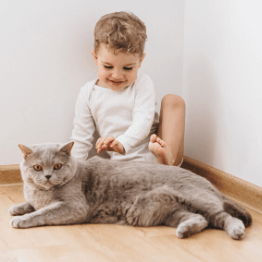HOUSE TRAINING FOR PUPPIES
By: Door Buddy Editors | Published: 02 January, 2024
There’s nothing more exciting than welcoming a new pup into the home! That soft fur mixed with those adorable eyes, what could be better?
One thing all new “paw-rents” face is the puppy house training phase. House training your puppy, and obedience training in general, is significant for the well-being of both your puppy and your sanity. We are here to help and give you all the ins and outs of house training for puppies.
If your doggo is not a puppy anymore but a little older, don’t worry about teaching an old dog new tricks, we also have a blog post on how to potty train an older dog with everything you need to know.
WHEN TO START PUPPY POTTY TRAINING
The sad news behind puppy house training is when done incorrectly, it can result in the number one reason behind surrendering dogs to animal shelters. Of course, keeping our pups happy and safe is our number one priority as “paw-rents”.
The trick to house training a puppy is to start early. Establishing proper toilet habits when the puppy is young can last a lifetime. It can also be tough to break these lessons once they are set.
The best time to begin puppy potty training is when your pup is between 12 & 16 weeks old. Puppies younger than this generally lack the bowel and bladder control that is needed for proper house puppy training.
PUPPY POTTY TRAINING METHODS
Puppies aren’t born knowing where they may and may not do their business. It is every “paw-rent’s” responsibility to teach them this.
According to Mary Burch, Ph.D., director of the American Kennels Club’s Canine Good Citizen and S.T.A.R. Puppy programs, there are 3 main puppy training methods to consider that can help you potty train along with outside potty training:
1. Crate Training
Crate training gives your puppy a designated space where they can sleep and play in the house. The most important thing to remember is that crate training is in NO WAY “IMPRISONING” your dog.
Crate training a puppy gives your fur-baby a safe and calm space that is their own and can be a big help in helping a puppy develop self-control.
The concept behind crate training is that the puppy will not want to go to the toilet in his bed area. That is, of course, if you can resist those puppy cuddles in bed!
2. Paper Training
While taking your new puppy outside for bathroom breaks is ideal, it is not always possible. In these situations potty training a puppy on paper pads can play a big role in successful potty training.
Start by deciding whether you will be using disposable or reusable puppy pads. You will need to be patient and make sure that you take them to their designated potty area regularly.
3. Indoor Potty Training
While it is vital to train your puppy to do their business outside, other indoor bathroom solutions can be super helpful in cold winter months or if you live in an apartment.
There are multiple options available like fake grass and indoor dog litterboxes. You can decide what will work best in your indoor space for your new puppy.
PUPPY HOUSE TRAINING TIPS
Whether you are taking your new fur-baby outside every hour or making use of some indoor puppy potty training methods, there are a few basic tips that can help you achieve success:
Allow Easy Access to the Toilet Area
In our list of puppy house training tips, this one is the most important! To get your pup comfortable with a toilet routine, you should always provide the puppy with as much unrestricted access to the established toilet area as you possibly can.
Build a Routine
Get yourself and your fur-baby into a routine so that they can learn when you usually take breaks to let them out.
When you are at home, try to take the puppy to the toilet area every hour or so. Remember puppies can’t control their bladder until they are 16 weeks old and can only hold their bladder as long as their age plus one hour. So a four-month-old puppy can only hold it for 5 hours.
When you are not at home or cannot supervise the puppy, you must be sure the puppy cannot make a mistake. This means confining the puppy to a small area that has been thoroughly puppy-proofed.
Puppy-Proof the Toilet Area
Puppy-proofing a room is very similar to baby proofing a room since puppies chew on everything. If you’re looking to confine your little doggo to an area, it’s best to utilize some form of dog proofing, such as our Door Buddy Door Strap.
This will prevent your dog from exiting the room while still giving you the freedom to come and go as you please. Doing so can be a helpful aid in getting your pooch comfortable with the area.
Differentiate the Toilet Area From Your Home
Puppy training with the hopes of promoting outdoor bathroom time is always a good idea. For this to work, your puppy should never be encouraged to do their business on anything that resembles the hardwood flooring, tile, or carpet they may encounter in a home.
When they do go to the bathroom in the right places, it is important to always praise and reward your puppy! Every time he or she goes outside or on their puppy sheet, positive reinforcement will help them associate successful toileting with positive behavior.

Keep a Feeding Schedule
Always keep a set schedule when feeding your puppy and provide constant access to fresh, clean drinking water. A consistent feeding schedule equals a regular toilet schedule that should give you an idea of when your pup needs your supervision.
Be Patient
And finally, it is essential to be patient when house training your puppy. House training a puppy can take as long as several months, but it is much easier to house train right the first time than to retrain later down the line.
WHAT NOT TO DO WHEN HOUSE TRAINING YOUR PUPPY
Now that we've covered the dos, it's time to take a look at what not to do when house training your puppy:
Never reprimand or punish your puppy for mistakes. Punishing the little thing will only cause fear and confusion.
Do not leave food out for the puppy all night long. Keep to a set feeding schedule to make your dog’s toilet schedule as consistent as possible.
Do not give your pup the freedom to roam the halls until they’re properly house trained.

PUPPY POTTY TRAINING SCHEDULE
We know how important a good potty training schedule is, but we also know how difficult it can be to get one that works. That is why we have put together the following puppy training schedule for you.
The best part of all? It is easy to implement and very flexible, just shift it to start when you wake up in the morning.

CONCLUSION: HOUSE TRAINING FOR PUPPIES
House training your puppy is not always the easiest thing to do, and some dogs tend to be much easier to house train than others.
The most important things to remember while house training is to be patient, consistent, and loving as you train your new pal. Remember: a rushed, frightened, or intimidated dog will not be able to learn the musts of early puppy training.
With these puppy house training tips, you’ll find that puppy training is easier than you ever expected!
While your pup is still young, it's also a great time to start training your puppy about cats and their litter boxes. Find our top tips on how to keep the dog out of the litter box.





